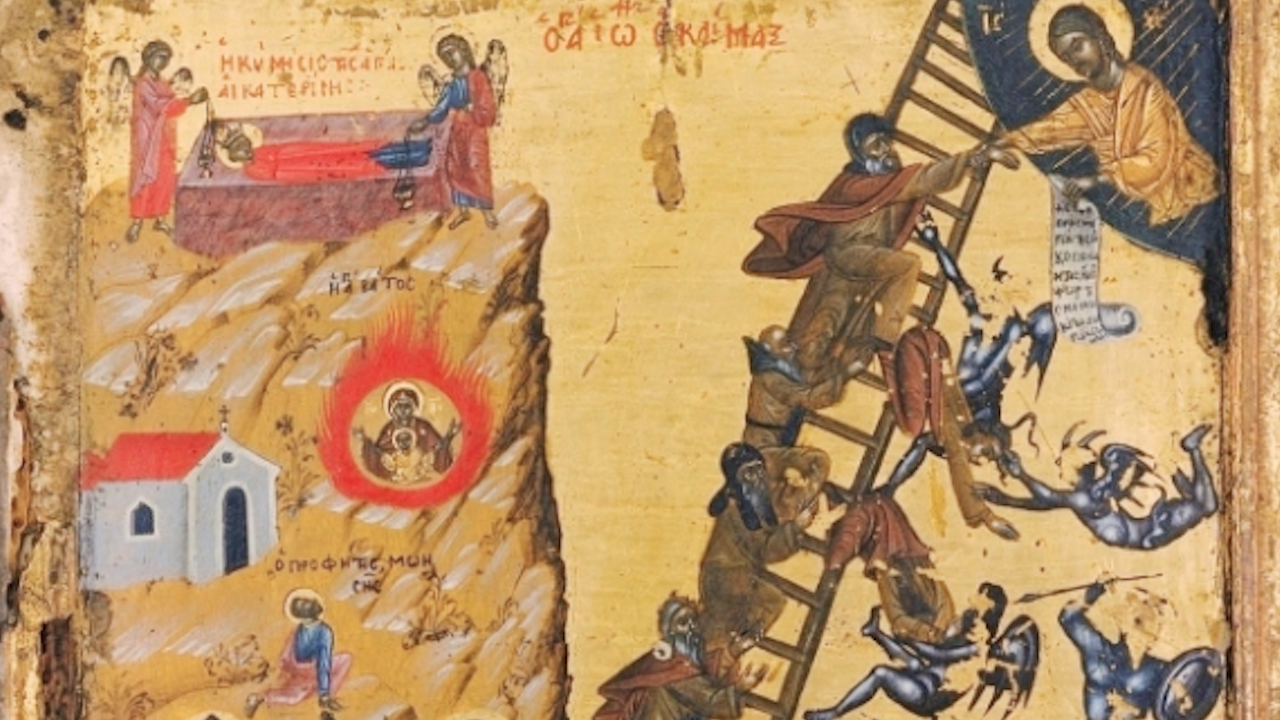1. Essays & Reflections:
If you are like many Americans, holed up at home and trying to learn how to work remotely, here’s some simple but solid advice:
"How to Work from Home (according to Churchill, Einstein, and Napoleon)."
2. Essays & Reflections:
St John of the Ladder is commemorated twice a year in the Orthodox Church: the Fourth Sunday of Great Lent (yesterday in this year of our Lord 2020) and today, March 30. He’s the patron saint of our headquarters, which is named after him: “The Ladder." Here’s a good introduction to this largely unknown desert hero:
"St. John Climacus: the Forgotten Saint.”
3. Essays & Reflections:
Every year during Lent, monks in the Orthodox tradition read in its entirety
The Ladder of Divine Ascent
by St. John of the Ladder. In the first step (of thirty), he tells us, “It is not because we have not performed miracles, nor because we did not do theology, but because we have not wept for our sins that we will be condemned in the Eternal Judgment…” According to Metropolitan Anthony of Sourozh, reflecting on this passage, “sin kills everything in life — and we feel it as death least of all. We weep for everything; we complain of everything; we grieve for everything except for the fact that we are dying alive, that an impervious ring of alienation is gradually being formed around us, separating us from the sinner, from the righteous, and from God…
That is why John Climacus puts the requirement for us to weep for our sins at the very heart of our salvation, our repentance. Read the full reflection here:
"St John Climacus: We Should Weep for Our Sins."
4. Books:
St. John of the Ladder’s admonition echoes Christ’s first message: “Repent” (Matt. 3:2, Mk. 1:15). And repentance is at the heart of Lent, as Fr. Alexander Schmemann teaches us in his book
Great Lent: Journey to Pascha.
Click here for the Eighth Day Books review.
5. Poetry:
Today’s poem by Scott Cairns offers an image of a saint like St John of the Ladder, a holy man feeding on the Bible and the Fathers, one worthy of our imitation: "Eremite."
6. Bible:
Is. 37:33-38:6, Gen. 13:12-18, and Prov. 14:27-15:4. Online here.
7. Liturgy:
From Matins of the Fourth Sunday of Lent on which we celebrate the memory of our Holy Father John of the Ladder: "O loving Lord, for our sakes Thou was born of a Virgin and hast endured Crucifixion, despoiling death by death, and as God Thou hast revealed the Resurrection. Despise not Thy handywork, but show Thy love for man, O merciful Lord. Accept the intercessions made on our behalf by the Theotokos who bore Thee; and save, O our Savior, Thy people from despair. // O John our father, saint of God, thou was revealed as a citizen of the desert, an angel in a body, and a worker of miracles. Through fasting, prayer, and vigils thou hast received heavenly gifts of grace, and thou healest the sick and the souls of those that turn to thee with faith. Glory be to Him who gave thee strength; glory be to Him who crowned thee; glory be to Him who through thee grants to all men healing."
8. Today’s Word from the Fathers
offers more from the first step of St John of the Ladder’s book The Ladder of Divine Ascent: "God belongs to all free beings. He is the life of all, the salvation of all – faithful and unfaithful, just and unjust, pious and impious, passionate and dispassionate, monks and laymen, wise and simple, healthy and sick, young and old – just as the effusion of light, the sight of the sun, and the changes of the seasons are for all alike; “for there is no respect of persons with God” (Rom. 2.11). // The irreligious man is a mortal being with a rational nature, who of his own free will turns his back on life and thinks of his own Maker, the ever-existent, as non-existent. The transgressor is one who holds the law of God after his own depraved fashion, and thinks to combine faith in God with heresy that is directly opposed to Him. The Christian is one who imitates Christ in thought, word, and deed, as far as is possible for human beings, believing rightly and blamelessly in the Holy Trinity. The lover of God is he who lives in communion with all that is natural and sinless, and as far as he is able neglects nothing good. The continent man is one who lives in the midst of temptations, snares, and turmoil, and who is eager to imitate with all his might those who are free from turmoil. Monasticism is an angelic order and state achieved in an earthly and soiled body."
**All books (and icons) in print available from Eighth Day Books. Please support an independent bookstore that believes in the eighth day resurrection of our God and Lord and Savior Jesus Christ! Give them a call at 1.800.841.2541 or visit there website here. And don't forget Eighth Day Members
(Patrons+) receive 10% discount, plus lots of other perks! 









